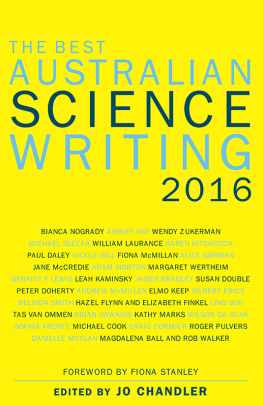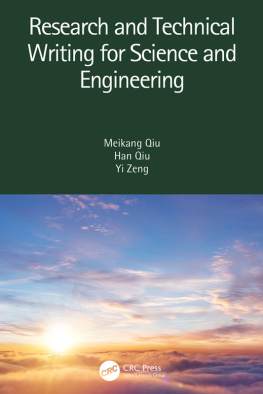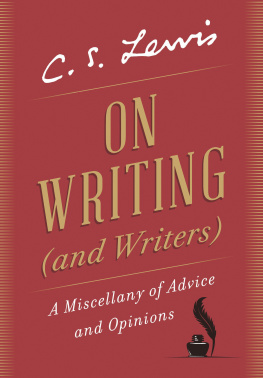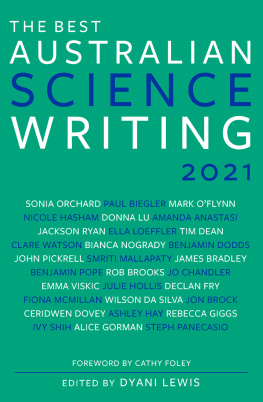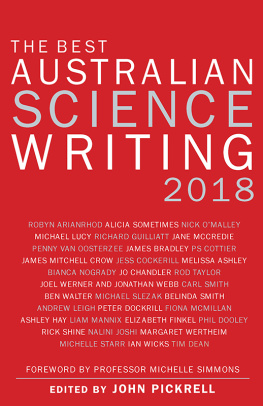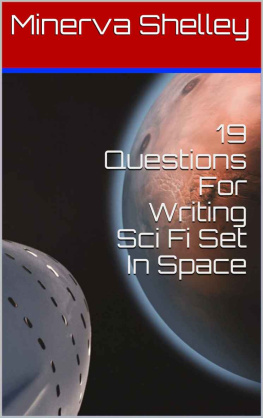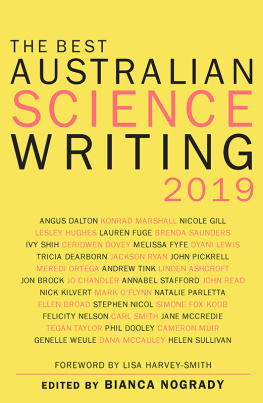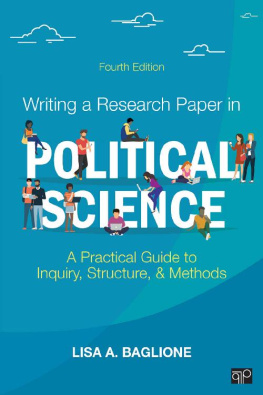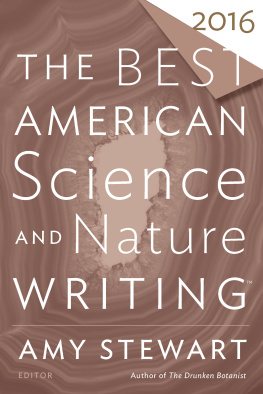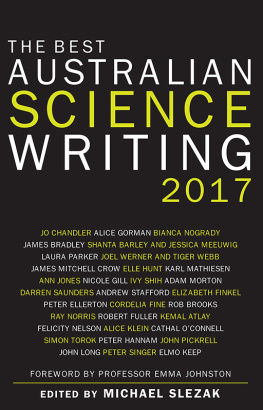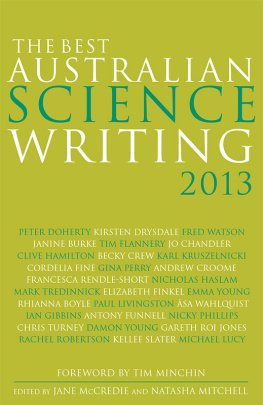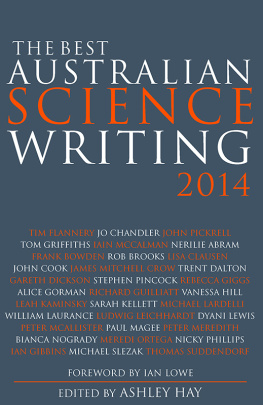THE BEST
AUSTRALIAN
SCIENCE
WRITING
2016
Jo CHANDLER is a Walkley Award-winning freelance journalist, author and editor. She has more than 20 years experience in professional media, including roles at The Age, Sydney Morning Herald and Good Weekend and freelance reporting for The Guardian, The Monthly and New Scientist among others. She is the author of two books, including Feeling the Heat (MUP 2011), on climate science.
THE BEST
AUSTRALIAN
SCIENCE
WRITING
2016
FOREWORD BY PROFESSOR FIONA STANLEY AC
EDITED BY JO CHANDLER

A NewSouth book
Published by
NewSouth Publishing
University of New South Wales Press Ltd
University of New South Wales
Sydney NSW 2052
AUSTRALIA
newsouthpublishing.com
University of New South Wales Press Ltd 2016
First published 2016
10 9 8 7 6 5 4 3 2 1
This book is copyright. While copyright of the work as a whole is vested in University of New South Wales Press Ltd, copyright of individual chapters is retained by the chapter authors. Apart from any fair dealing for the purpose of private study, research, criticism or review, as permitted under the Copyright Act, no part of this book may be reproduced by any process without written permission. Inquiries should be addressed to the publisher.
National Library of Australia
Cataloguing-in-Publication entry
Title: Best Australian Science Writing 2016 / Jo Chandler
ISBN: 9781742235035 (paperback)
9781742242606(ebook)
9781742248059 (epdf)
Subjects: Technical writing Australia.
Communication in science Australia.
Science in literature.
Other Creators/Contributors: Chandler, Jo, editor.
Stanley, Fiona, writer of foreword.
Dewey Number: 808.0665
Design Josephine Pajor-Markus
Printer Griffin
All reasonable efforts were taken to obtain permission to use copyright material reproduced in this book, but in some cases copyright could not be traced. The publisher welcomes information in this regard.
This book is printed on paper using fibre supplied from plantation or sustainably managed forests.

Foreword
Professor Fiona Stanley AC
My first real memory of science was at about the age of three. I was with my father in his laboratory at Prince Henry Hospital, Sydney, an institution that specialised in infectious diseases.
Luckily for the patients, it looked on to the pretty rocks of Little Bay, had views across the Pacific and was surrounded by trees, a golf course and the bush. It was on the famous Bondi tram-line, which wound its way from La Perouse past the Long Bay Jail and a firing range, the same line that took me and my brother to our primary school at Matraville.
It was 1949 and the fear of paralytic polio abounded in many developed countries, including Australia. My father was extracting the brains and spinal cords of mice infected with polio virus and injecting them into chimpanzees to develop a live vaccine. I remember the chimpanzees eating bananas and the thin, cellophane-like skulls of the mice, animals blissfully unaware of their contribution to scientific knowledge.
My parents read to us no TV in those days from books about science. The images I formed in my mind as my father read aloud descriptions of the ant colonies and their communal behaviour are still vivid: I was hooked! This early interest in biology lead to years of study at medical school and a specialisation in public health. My initial curiosity about science had turned into something deeper, a sense of excitement and passion as I began to see how this endeavour could prevent disease and enhance population health.
My public health career involved working with Australias First Nations people. This expanded the way I thought about my profession, their world views offering me new insights into how health and wellbeing is shaped by our beliefs. And now, in semi-retirement, I am delighting in the natural sciences and the sheer beauty of our wildernesses, even as I wonder how they will fare in a 21st century that seems hell bent on their destruction.
*****
Learning about science enables democracy. This was the main reason for me wanting to serve on the ABC board, which I have done for the past five years. As part of my contribution, I chaired a panel to review science broadcasting in the ABC. We compared the ABC to that outstanding public broadcaster, the BBC, and found that we do remarkably well given our size and budget. Our recommendation was that the ABC remain steadfast in its excellent reporting of science, including training the next generation of great scientific journalists.
The fundamental asset of any broadcaster or publisher is a band of intelligent, wacky individuals who are passionate about making all kinds of complicated science available to all of us. The essays in The Best Australian Science Writing come from such people.
I have enjoyed reading all of them. I have been stimulated, informed, annoyed and amazed. Not all the authors are scientists, but every one of them has a deep interest in science, its ideas, its power to bring about positive change and do good. I was captivated by our eucalypts and the habitats they provide for so many other plants, animals and insects; I felt scared to learn that their narrow survival conditions are threatened by climate change (Ashley Hay). I could hardly believe the extraordinary migration story of eels down streams and waterways, in order to breed over 3000 km from our shores, a journey reversed as they slip and slide back up those same waterways and 100-metre-high dam walls as maturing adults (James Bradley).
I was charmed by the science of discovering how certain orchid species mimic the smell and appearance of a female wasp to enable pollination, a story which began back in 1927 when an observant Edith Coleman noticed that male wasps were entering the orchid flower backwards (Susan Double).
Brian Hawkinss lovely essay describes Simon Grove carefully cataloguing insects on the Tarkine Bush Blitz and gives us a sense of the dedication required to document our world. It is reassuring to know that we have such people who record this information on our behalf.
There are a series of essays about environments altered by climate change, exploitation or greed. Many give us hope that, with science on our side, we will manage to ensure a future for life on Earth. Peter Doherty, who continues to lobby our politicians and others to act, has written an elegant piece on what kind of reality we want. Nature cannot be fooled, he writes. What reality do we prefer to know? The truth as understood by those with real professional expertise or some invented narrative favoured by PR people? It is an excellent comment on prediction and risk, as he makes the case for preventive medicine for the planet.
I was frightened by the degree to which the Antarctic glaciers are melting, but reassured about the commitment of Australian businesses to renewable energy. I laughed in spite of myself at William Laurances piece about the known unknowns and knowns, to paraphrase Donald Rumsfeld. Using humour is very effective in making a serious point about how difficult it is to predict the future and yet how vital it is that we act now to try to avert disasters.
And there are a great group of essays on medical and health topics, from how beetles are used to clean human bones for use in anatomy classes (Andrew McMillen), how people are infecting each other by poor hygiene (Karen Hitchcock), and how modern technology is changing medicine but may be damaging the relationship of the doctor and her patient (Leah Kaminsky).
Next page
